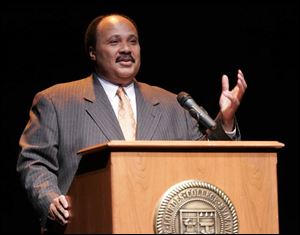
Get involved, King's son tells audience in Sylvania
2/13/2006
'I must say we've had great strides in this nation, but we still have a long way to go,' Martin Luther King III, eldest son of the slain civil rights leader, says in a talk at Lourdes College.
Martin Luther King III admitted it was difficult to keep his speech date at Lourdes College last night, five days after burying his mother, civil rights icon Coretta Scott King.
He said, though, it would have been just what his mother would have wanted and expected, reminding his audience at the Franciscan Theatre and Conference Center that she led a march in Memphis the day before the funeral of her husband, the Rev. Martin Luther King, Jr., in 1968.
Mr. King, eldest son of the slain civil rights leader, spoke to about 800 people in Sylvania last night, challenging the audience to get involved in social issues, calling for a new nonviolence movement, and criticizing the lack of attention on the needs of the poor and oppressed.
"People often ask, 'Have we achieved the dream of Martin Luther King, Jr.?'●" Mr. King said during his 40-minute speech. "I must say we've had great strides in this nation, but we still have a long way to go."
He talked about persistent inequities in education, health care, housing, and employment.
"Since the civil rights movement, race relations continue to undermine America's credibility as a champion of freedom and democracy," Mr. King said. "Until all races achieve a fair share of the money and educational opportunities in our society, our loftiest ideals of freedom and equality will be viewed as empty rhetoric by other nations."
He said the government seems to have an open checkbook when it comes to the military, but pinches pennies when it comes to education and social issues. "America leads the world in military spending and technology, but 21 other countries have a lower rate of infant mortality," Mr. King said. "We're first in the number of millionaires and billionaires, but 20 countries have higher average math scores for eighth-grade students. If the wealthy nations cut their budgets by 10 percent and invested it in sound and worthy projects in developing nations, we could end world poverty in less than one generation."
He said more minorities should be in decision-making positions in agencies like the Federal Emergency Management Agency.
"It's already been proven to many, many people who were, and are, outraged by the treatment of African-Americans and poor people in New Orleans," Mr. King said. "Many of them showed great generosity and courage in addressing that crisis. If we had more people of color making decisions in national emergencies, it would help guard against the repeat of neglect we saw in New Orleans."
Mr. King called on people to start a nonviolence movement on the more pressing social issues of today, such as health-care insurance, education, and criminal justice. He said, though, that practicing nonviolence is a lifestyle that must become a part of a person's everyday life.
"When nonviolence is applied with care and preparation, it is the most powerful force for social change and peaceful conflict [resolution] that is available to oppressed people anywhere in the world," Mr. King said. "Many people know that nonviolence was the method that achieved victories in the civil rights movement, the liberation of India, and the farm workers movement led by Cesar Chavez."
During a news conference before the speech, Mr. King said the best way he could honor his mother is to press on with the work she and his father championed by working to eliminate racism and bigotry of all kinds.
"The last few days have been difficult for us as a family," Mr. King said. "We know that mom would want us to carry on. She first and foremost taught us how to love, and how to forgive."
He said he didn't see the controversy stirred by speeches made by former President Jimmy Carter and the Rev. Joseph Lowery at his mother's funeral.
"When you talk about Martin Luther King or Coretta Scott King, you really can't talk about either of them without talking about our nation not addressing issues like poverty or race," Mr. King said.
Contact Clyde Hughes at: chughes@theblade.com or 419-724-6095.